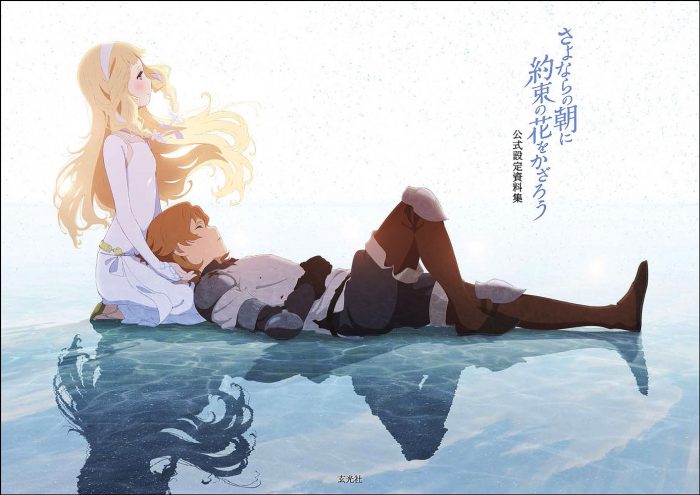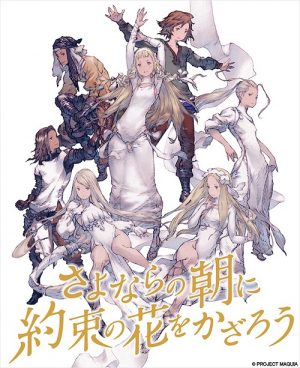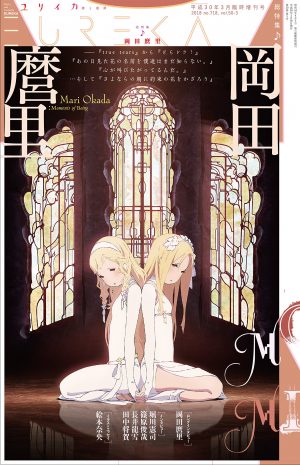
Weaving Love and Sadness
- Episodes :
- Genre : Drama, Fantasy, Adventure
- Airing Date : February 24, 2018
- Producers : P.A. Works
Contains Spoilers
Sayonara no Asa ni Yakusoku no Hana wo Kazarou Introduction
Young orphaned girl Maquia is a member of the Iorph, a hidden race of people who live for centuries without aging beyond their teenage years. Called “The Clan of the Separated” by outsiders, the isolated tribe lives away from others in an idyllic oasis, their culture centered around weaving their memories into special fabric called Hibiol on gigantic looms.
Everything changes when Iorph is attacked by the dragon-riding knights of neighboring kingdom Mezarte who, out of desperation to boost their fading power, seek to steal the Iorph’s secret of longevity. Unable to fight back, the village is left in ruin. Many are killed, and Maquia’s friend Leilia is kidnapped and forced into marriage with the Mezarte prince. Maquia herself only narrowly escapes when one of the dragons goes berserk, carrying her off tangled in the Hibiol.
Falling into the forest, Maquia is at her wit’s end. Preparing to take her own life, she edges towards the edge of a cliff, only stopping when she hears crying. Following the sound, she discovers a baby in the arms of his dead mother in a traveler’s camp ransacked by bandits. Rescuing the baby, who she names Ariel, Maquia flees to the village of Helm where the two are taken in by farmer Mido. Thus begins a challenging life as a single mother separated from her people and destined to outlive her adopted son in a world full of persecution and war.
What We Liked About Maquia
First and foremost, Maquia has great production value. As P.A.Works’ first feature-length, theatrical release and Mari Okada’s directorial debut, the team clearly wanted to showcase their best work. The art, music, and animation are beautiful, and Okada’s trademark emotional storytelling is as strong as ever. With work from famous Final Fantasy and Nier: Automata character designer Akihiko Yoshida, animation director Tadashi Hiramatsu (FLCL, Yuri!!! On Ice, Gurren Lagann), main animator Toshiyuki Inoue (Ghost in the Shell, Akira, Paprika), composer Kenji Kawai (Ghost in the Shell, Patlabor, Barakamon), and more, Maquia has a lot of star power bringing the story to life.
Probably the most interesting thing about Maquia is what it does within fantasy, a genre rife with Tolkien wannabee tales of giant battles against ultimate evils and generic JRPG derivative drivel. While Maquia’s setting isn’t totally original, with its beautiful, ageless totally-not-elves, dragons and such, it’s all done with a quality that makes it more than forgivable. However, what really sets Maquia apart in the genre is its storytelling with motherhood at its center and how it uses fantastic elements to explore new facets of that relationship.
Why You Should Watch Maquia

1. Touching Drama
If you’re familiar with Mari Okada’s previous works, such as Anohana, Kokoro ga Sakebitagatterunda. (Anthem of the Heart), ToraDora!, and Nagi no Asukara (A Lull in the Sea), you’ll know you’re likely in for an emotional experience and Maquia is no exception. Seeing Ariel and Maquia’s relationship develop through many trials as Ariel ages from baby to adult adds a lot of attachment to the characters that make the dramatic moments impactful. Side characters, like knight commander Izol, are also fleshed out enough to get a good sense of their personality.
2. Beautiful Visuals
As mentioned before, Maquia’s art is top notch, particularly with the backgrounds and world design. From the picturesque white-walled buildings of Iorph to the countryside fields of Helm and intricate cities and centers of industry following, the level of detail is breathtaking. The animation is also well done, save for a few minor 3DCG hiccups, especially in the climactic battle scene juxtaposed with a mother giving birth.
3. Strong Voice Acting & Music
Composer Kenji Kawai brings the story to life with a grand orchestral score, and singer rionos’ ending theme, Viator, is a hauntingly beautiful bookend. The Japanese voice acting is also great, in particular Manaka Iwami and Ai Kayano as Maquia and Leilia, and Hiroaki Hirata as mysterious drifter Baro.
Why You Should Skip Maquia
1. Too Convenient
While we’d argue that many “convenient” events did work to make their moments stronger, some were tinged with artificiality. In particular, Maquia stumbling upon Ariel’s wife while she’s giving birth seems a bit much, albeit mostly only when looking back after it's all over.
2. Slightly Rushed Subplots & Flashbacks
The side stories of Leilia’s forced marriage and separation from her daughter and Crim’s attempts to rescue her do add to the story but aren’t given enough time to develop to be as impactful as they could have been, with some events seeming purely for shock value than deep moments. Another minor gripe is a slight overuse of flashbacks, which sometimes felt unnecessary.
Final Thoughts
Despite some minor setbacks, Maquia is a great film with much to offer. Its story centering on family and motherhood feels fresh and moving and the way it utilizes fantasy to not only provide beautiful setpieces but also enhance its storytelling is welcome innovation within the genre. With this stunning directorial debut from Mari Okada, we can’t wait to see her future work! Please let us know how you feel in the comments below!
Recommended Post


